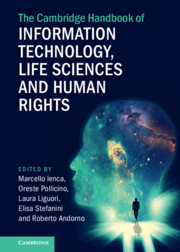Book contents
- The Cambridge Handbook of Information Technology, Life Sciences and Human Rights
- The Cambridge Handbook of Information Technology, Life Sciences and Human Rights
- Copyright page
- Contents
- Tables
- Contributors
- Acknowledgements
- Introduction
- Part I Life Sciences and Human Rights
- Part II Information and Communication Technologies and Human Rights
- 10 The Right to Internet Access
- 11 Face Recognition and the Right to Stay Anonymous
- 12 Artificial Intelligence and the Right to Algorithmic Transparency
- 13 Machine Learning, Cognitive Sovereignty and Data Protection Rights with Respect to Automated Decisions
- 14 Going Dark or Living Forever
- 15 Artificial Intelligence and Children’s Rights
- 16 Internet of Things Devices, Citizen Science Research and the Right to Science
- 17 Connected but Still Excluded?
- Part III Towards a Convergence
13 - Machine Learning, Cognitive Sovereignty and Data Protection Rights with Respect to Automated Decisions
from Part II - Information and Communication Technologies and Human Rights
Published online by Cambridge University Press: 17 May 2022
- The Cambridge Handbook of Information Technology, Life Sciences and Human Rights
- The Cambridge Handbook of Information Technology, Life Sciences and Human Rights
- Copyright page
- Contents
- Tables
- Contributors
- Acknowledgements
- Introduction
- Part I Life Sciences and Human Rights
- Part II Information and Communication Technologies and Human Rights
- 10 The Right to Internet Access
- 11 Face Recognition and the Right to Stay Anonymous
- 12 Artificial Intelligence and the Right to Algorithmic Transparency
- 13 Machine Learning, Cognitive Sovereignty and Data Protection Rights with Respect to Automated Decisions
- 14 Going Dark or Living Forever
- 15 Artificial Intelligence and Children’s Rights
- 16 Internet of Things Devices, Citizen Science Research and the Right to Science
- 17 Connected but Still Excluded?
- Part III Towards a Convergence
Summary
Human behaviour is increasingly governed by automated decisional systems based on machine learning (ML) and ‘Big Data’. While these systems promise a range of benefits, they also throw up a congeries of challenges, not least for our ability as humans to understand their logic and ramifications. This chapter maps the basic mechanics of such systems, the concerns they raise, and the degree to which these concerns may be remedied by data protection law, particularly those provisions of the EU General Data Protection Regulation that specifically target automated decision-making. Drawing upon the work of Ulrich Beck, the chapter employs the notion of ‘cognitive sovereignty’ to provide an overarching conceptual framing of the subject matter. Cognitive sovereignty essentially denotes our moral and legal interest in being able to comprehend our environs and ourselves. Focus on this interest, the chapter argues, fills a blind spot in scholarship and policy discourse on ML-enhanced decisional systems, and is vital for grounding claims for greater explicability of machine processes.
Keywords
- Type
- Chapter
- Information
- Publisher: Cambridge University PressPrint publication year: 2022
- 3
- Cited by

